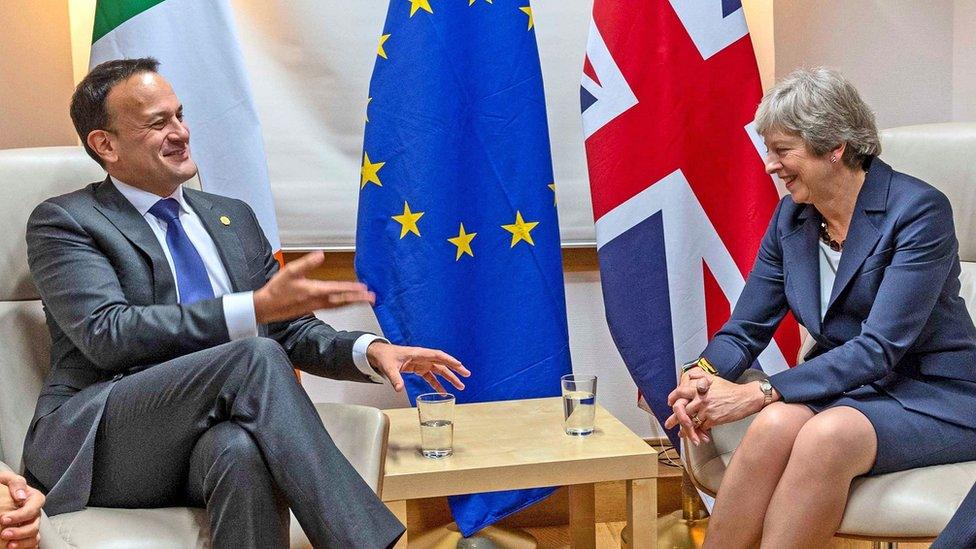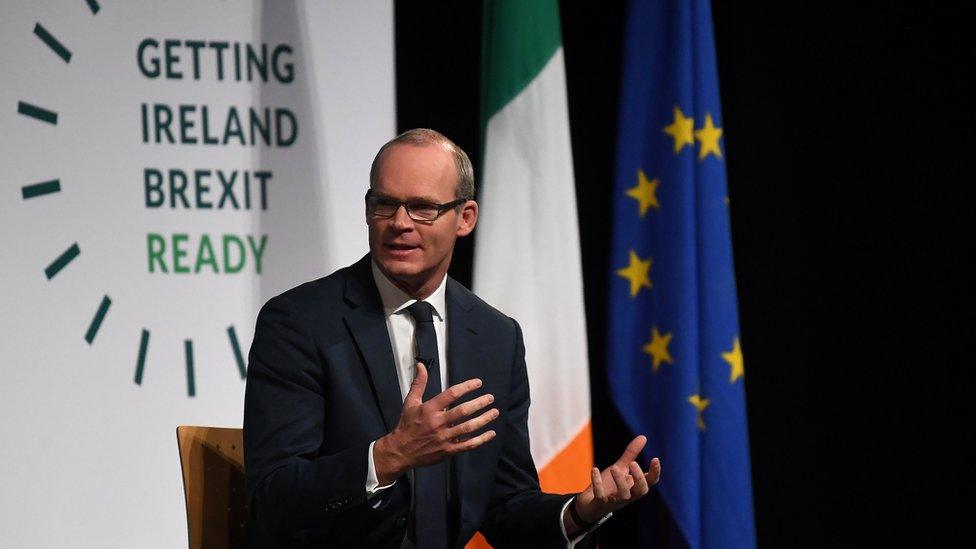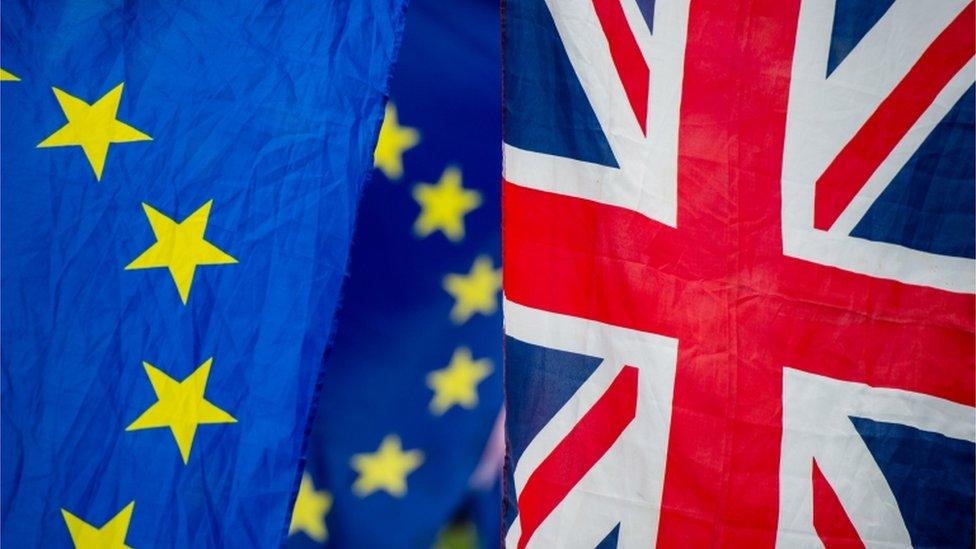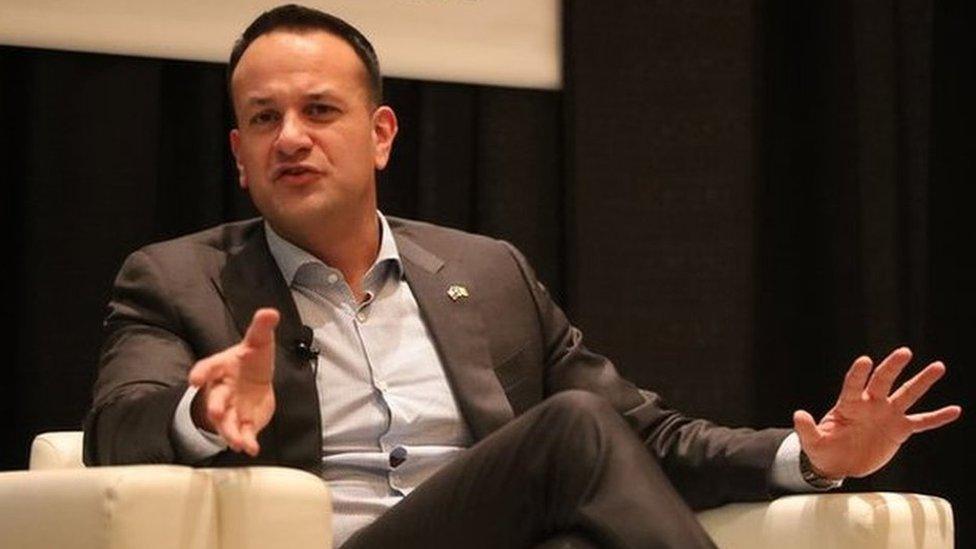Brexit: Irish 'can't countenance' time-limited backstop
- Published

Leo Varadkar and Theresa May, seen here in Brussels in October, spoke on the telephone on Monday
The idea of a time-limited backstop after Brexit has been ruled out again by the Irish prime minister.
Taoiseach Leo Varadkar said he "can't countenance" the idea of an expiry date and such a deal would not be "worth the paper it's written on".
His comments follow reports that the UK wants the unilateral right to end the backstop with three months' notice.
The backstop is an arrangement that applies if the Irish border cannot be kept frictionless as part of a deal.
Mr Varadkar said he expected the British government to stick to the commitments it made to the EU last December for a legally-enforceable backstop to avoid a hard border between Northern Ireland and the Republic of Ireland.
During a telephone conversation on Monday, he told UK Prime Minister Theresa May that he would consider proposals for a "review mechanism" of the backstop.
He also said that the outcome of a review could not involve a unilateral decision to end the backstop.
"He recalled the prior commitments made that the backstop must apply 'unless and until' alternative arrangements are agreed," an Irish government spokeswoman said.
A Downing Street spokesperson said: "They agreed the intention was that the backstop should only be a temporary arrangement and that the best solution to the Northern Ireland border would be found by agreeing a future relationship between the UK and the EU.
"In order to ensure that the backstop, if ever needed, would be temporary, the prime minister said that there would need to be a mechanism through which the backstop could be brought to an end."
Following the leaders' phone call a spokesperson for Number 10 added: "We have made good progress but clearly in relation to the backstop there are outstanding and significant issues. In terms of resolving those, those talks are ongoing."
'Commitments'
The Daily Telegraph reported that the Brexit Secretary Dominic Raab made the time-limited proposal to Irish Foreign Minister Simon Coveney in London last week.
The UK's Department for Exiting the European Union said: "We wouldn't comment on private meetings."

Mr Coveney's tweet was retweeted by the EU's deputy chief negotiator
However, Mr Coveney has also insisted that such an arrangement would never be agreed by the Irish government or the EU.
In a tweet on Monday, Mr Coveney said: "The Irish position remains consistent and very clear that a "time-limited backstop" or a backstop that could be ended by UK unilaterally would never be agreed to by Ireland or EU.
"These ideas are not backstops at all and don't deliver on previous UK commitments."
Allow X content?
This article contains content provided by X. We ask for your permission before anything is loaded, as they may be using cookies and other technologies. You may want to read X’s cookie policy, external and privacy policy, external before accepting. To view this content choose ‘accept and continue’.
He was supported by the EU's deputy chief negotiator Sabine Weyand who tweeted, "still necessary to repeat this, it seems".
Mr Varadkar was asked about the proposal on Monday as he attended the launch of a new social housing development in Dublin.
He described the UK as a "divided kingdom", which he said has not helped the negotiation process.
"The UK in many ways is a divided kingdom, the people are split 50/50 over whether they want to leave the European Union or not," he said.
"The cabinet seems divided, the government seems divided, Parliament is divided, and that has made it very difficult to come to an agreement.
"I'd much prefer to have a united kingdom, a united country, to be our partner in these negotiations, but we don't, so we have to work through."
Allow X content?
This article contains content provided by X. We ask for your permission before anything is loaded, as they may be using cookies and other technologies. You may want to read X’s cookie policy, external and privacy policy, external before accepting. To view this content choose ‘accept and continue’.
Last week, Mr Varadkar said Brexit was fraying relations between Ireland and Britain.
Both the EU and UK have agreed the need for a backstop, but not how it should operate.
The EU has proposed a backstop that would mean Northern Ireland staying in the EU customs union, large parts of the single market and the EU VAT system.
The UK government has rejected that as a threat to the integrity of the UK.
It has so far suggested a backstop that would see the UK as a whole remaining aligned with the EU customs union, possibly for a limited time.
Meanwhile, Mr Coveney told the Seanad that while difficulties remain in the current Brexit negotiations, a no deal scenario is unlikely.
"No one wants a no deal endgame. Everyone loses," he said.
However, he said it was the government's responsibility to prepare for all scenarios.
He said as a result of this, work had intensified on a deal and no deal scenarios.
- Published3 November 2018

- Published3 November 2018

- Published16 October 2019
